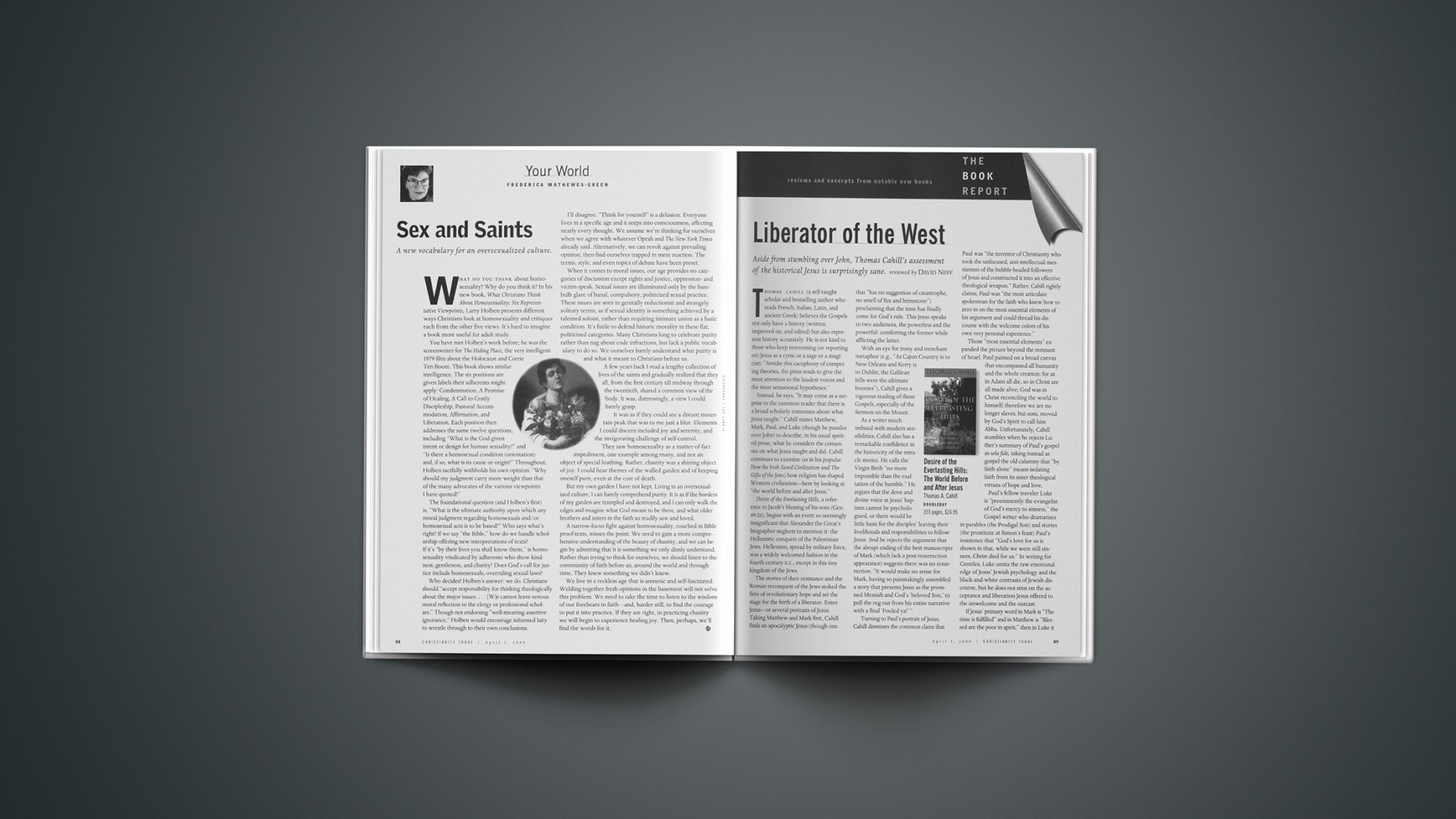What do you think about homosexuality? Why do you think it? In his new book, What Christians Think About Homosexuality: Six Representative Viewpoints, Larry Holben presents different ways Christians look at homosexuality and critiques each from the other five views. It’s hard to imagine a book more useful for adult study.
You have met Holben’s work before; he was the screenwriter for The Hiding Place, the very intelligent 1979 film about the Holocaust and Corrie Ten Boom. This book shows similar intelligence. The six positions are given labels their adherents might apply: Condemnation, A Promise of Healing, A Call to Costly Discipleship, Pastoral Accommodation, Affirmation, and Liberation. Each position then addresses the same twelve questions, including “What is the God-given intent or design for human sexuality?” and “Is there a homosexual condition (orientation) and, if so, what is its cause or origin?” Throughout, Holben tactfully withholds his own opinion: “Why should my judgment carry more weight than that of the many advocates of the various viewpoints I have quoted?”
The foundational question (and Holben’s first) is, “What is the ultimate authority upon which any moral judgment regarding homosexuals and/or homosexual acts is to be based?” Who says what’s right? If we say “the Bible,” how do we handle scholarship offering new interpretations of texts? If it’s “by their lives you shall know them,” is homosexuality vindicated by adherents who show kindness, gentleness, and charity? Does God’s call for justice include homosexuals, overruling sexual laws?
Who decides? Holben’s answer: we do. Christians should “accept responsibility for thinking theologically about the major issues. … [W]e cannot leave serious moral reflection to the clergy or professional scholars.” Though not endorsing “well-meaning assertive ignorance,” Holben would encourage informed laity to wrestle through to their own conclusions.
I’ll disagree. “Think for yourself” is a delusion. Everyone lives in a specific age and it seeps into consciousness, affecting nearly every thought. We assume we’re thinking for ourselves when we agree with whatever Oprah and The New York Times already said. Alternatively, we can revolt against prevailing opinion, then find ourselves trapped in mere reaction. The terms, style, and even topics of debate have been preset.
When it comes to moral issues, our age provides no categories of discussion except rights and justice, oppression- and victim-speak. Sexual issues are illuminated only by the bare-bulb glare of banal, compulsory, politicized sexual practice. These issues are seen in genitally reductionist and strangely solitary terms, as if sexual identity is something achieved by a talented soloist, rather than requiring intimate union as a basic condition. It’s futile to defend historic morality in these flat, politicized categories. Many Christians long to celebrate purity rather than nag about code infractions, but lack a public vocabulary to do so. We ourselves barely understand what purity is and what it meant to Christians before us.
A few years back I read a lengthy collection of lives of the saints and gradually realized that they all, from the first century till midway through the twentieth, shared a common view of the body. It was, distressingly, a view I could barely grasp.
It was as if they could see a distant mountain peak that was to me just a blur. Elements I could discern included joy and serenity, and the invigorating challenge of self-control.
They saw homosexuality as a matter-of-fact impediment, one example among many, and not an object of special loathing. Rather, chastity was a shining object of joy. I could hear themes of the walled garden and of keeping oneself pure, even at the cost of death.
But my own garden I have not kept. Living in an oversexualized culture, I can barely comprehend purity. It is as if the borders of my garden are trampled and destroyed, and I can only walk the edges and imagine what God meant to be there, and what older brothers and sisters in the faith so readily saw and loved.
A narrow-focus fight against homosexuality, couched in Bible proof-texts, misses the point. We need to gain a more comprehensive understanding of the beauty of chastity, and we can begin by admitting that it is something we only dimly understand. Rather than trying to think for ourselves, we should listen to the community of faith before us, around the world and through time. They knew something we didn’t know.
We live in a reckless age that is amnesic and self-fascinated. Welding together fresh opinions in the basement will not solve this problem. We need to take the time to listen to the wisdom of our forebears in faith—and, harder still, to find the courage to put it into practice. If they are right, in practicing chastity we will begin to experience healing joy. Then, perhaps, we’ll find the words for it.
Related Elsewhere
Larry Holben’s What Christians Think About Homosexuality is available from Amazon and other book retailers.
Frederica Mathewes-Green also authored last week’s Books & Culture Corner: “My Cab Ride With Gloria | Meeting a legend, tearfully.” (Mar. 3, 2000)
Visit Frederica Mathewes-Green’s Web site at www.frederica.com
Earlier “Your World” columns by Frederica Mathewes-Green columns include:
- Psalm 23 and All That (Feb. 15, 2000)
- The Abortion Debate Is Over (Dec. 28, 1999)
- The Thrill of Naughtiness (September 6, 1999)
- Escape from Fantasy Island (July 12, 1999)
- Men Need Church, Too (May 24, 1999)
- My Spice Girl Moment (January 11, 1999)
- Moms in the Crossfire (October 26, 1998)
- Gagging on Shiny, Happy People (September 7, 1998)
- Whatever Happened to Middle-Class Hypocrisy? (July 13, 1998)
- I Didn’t Mean to be Rude (May 18, 1998)
- So I’m Sorry Already (April 6, 1998)
- Don’t Blame the Publishers! (February 9, 1998)
Copyright © 2000 Christianity Today. Click for reprint information.










